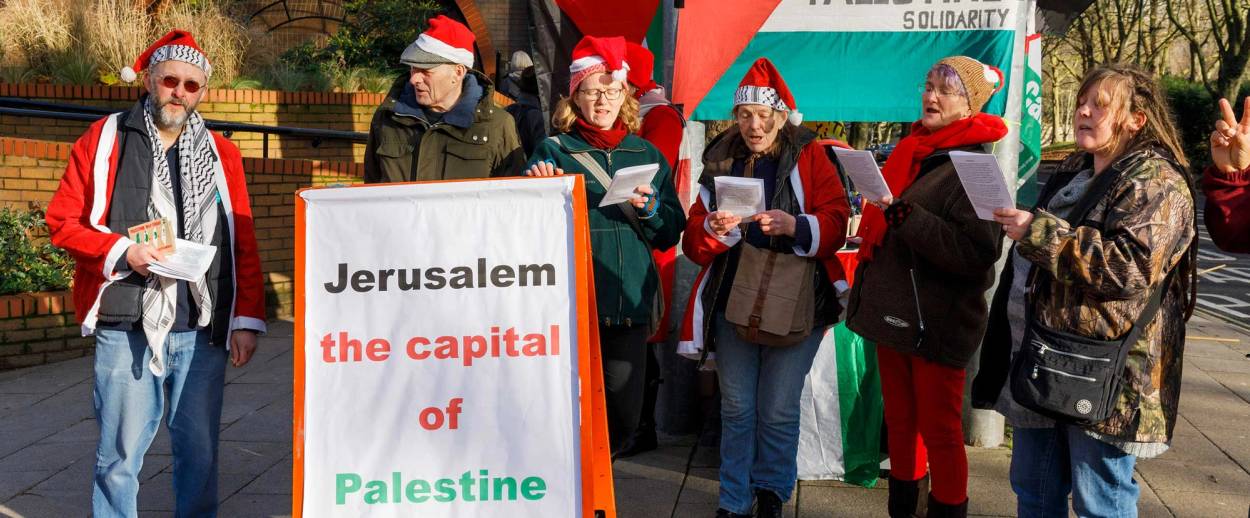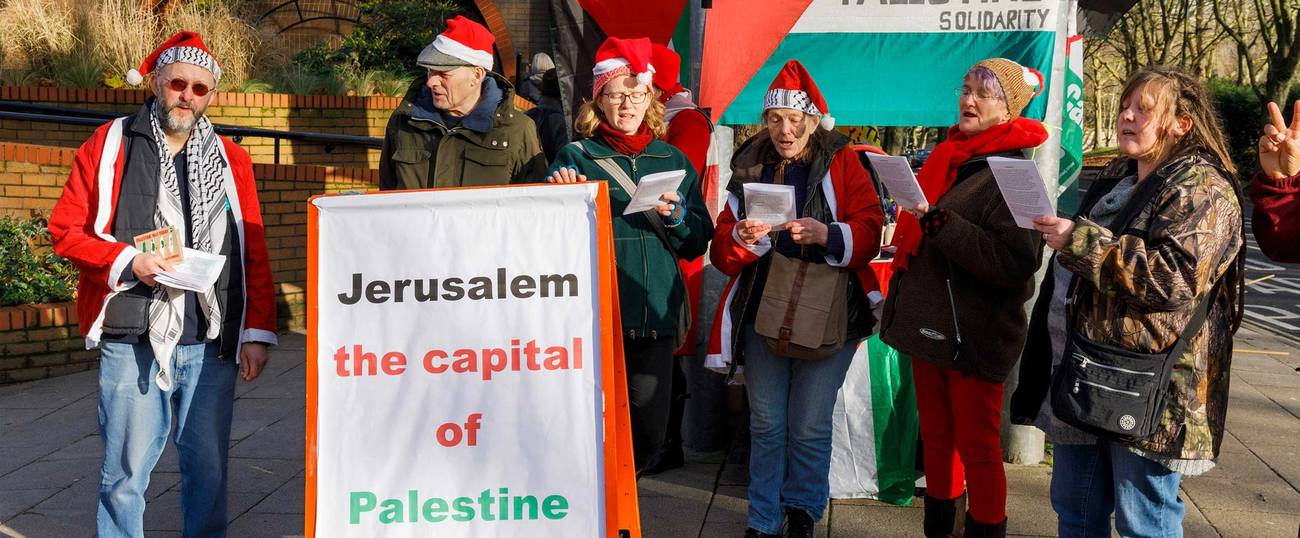Free Palestine
A small act of resistance in the middle of Soho at lunchtime




The Soho I live in today—not to be confused with the more chichi SoHo in Lower Manhattan—is not the Soho I came to 20 years ago. It’s still London’s most bohemian suburb, home to the satirical magazine Private Eye and writerly clubs like the Groucho and the Academy—though you might have trouble finding many writers in the former any more—but loucheness isn’t what it was.
If you want to throw your inheritance away in Soho today you do it in an artisanal chocolate shop not a strip joint. Francis Bacon used to roll drunk out of the Colony Room in Dean Street and stagger home to paint a masterpiece. There’s still drunkenness here but it’s the provjince of hen parties. Having failed to write a masterpiece, I stagger out of my apartment any night of the week and have to navigate the heaving bridesmaids piled high outside my front door. It might not be art but it’s life.
The other thing it’s not is politics. The whole point of bohemia is that it frees you to think your own thoughts. We live and let live. So I was much taken aback, the other week, while sauntering idly along Dean Street, to find myself the object of a sort of one-woman demonstration. What she called out was so unlike anything I expected to hear in Soho that I wondered whether I’d really heard it.
“Free Palestine!”
Could that be right? “Free Palestine!” in the middle of Soho at lunchtime.
I raised my eyes and looked around but everything was as normal. There was only the lingering presence of the words, like dust caught in a shaft of light. Had the woman passed me on the street? Had she leaned out of the window of an expensive restaurant? And how did I know her exhortation was intended for me, anyway?
Let’s just say I knew. The ears detect what’s aimed at them. And besides, a quick Jew-survey revealed no other likely Zionist in the vicinity. As for the woman herself, I no sooner replayed her words mentally than I attached them to a person I realize I had absent-mindedly taken in a microsecond before. A middle-aged, somewhat theatrical Jewish-seeming woman wearing, now I came to think of it, a PLO scarf. Funny how, under a strong impulsion, you can remember what you didn’t know you’d seen. There was a good chance it had worked that way for her, too, and that it was only after our paths had crossed that she realized she had brushed shoulders with the enemy.
I know how this story is beginning to sound. The thought occurred to me, too. Wasn’t there something delusional about the whole thing? But later in the day I was alerted to a social media posting from a certain E.G.—I’m going to confine her to her initials—in which she described seeing me outside the Soho Theatre and, having recognized me as someone “who often speaks out against justice for Palestinians”—“Justice for everyone except Palestinians!” I am frequently heard to cry as I walk through Soho—decided there and then to mount, in her own words, a “small act of resistance.”
Now the story came together. I had indeed been in the vicinity of the Soho Theatre, and E.G. turned out to be the founder of a Facebook group, Palestine Live, of which the leader of the British Labour Party, Jeremy Corbyn, had once been a member, but thought better of it when its associations with Holocaust deniers, Sept. 11 conspiracy theorists, and whatever you call people who believe that Zionists shoot babies for fun, came to light.
This happens to Corbyn often. His alacritousness to join is regarded as a mark of his passion to make the world a better place, until it is pointed out that it’s likely to make it a worse one. The long and the short of it, anyway, is that another example of Corbyn’s poor judgement in the matter of friends was finally brought to his attention, whereupon he cut whatever ties he had with E.G. and her organization, leaving her to continue her brave, small acts of resistance without A-list backing.
We quickly run into the rigid dualism of the activist, where whatever isn’t wholly good in their eyes must be wholly evil.
I’ve been trying to work out why her words offend me retrospectively. Does it go back to her original decision to embrace ideologies and symbols positively inimical to the faith in which I imagined her to be born? There must be an exhilaration in apostasy. Only imagine the first time the daughter of Jewish parents wraps herself in a keffiyeh. That this is a thrill a number of Jews have chosen to experience in our time should give us pause. Is not sympathy for others enjoined upon us? “Love the stranger,” Deuteronomy commands, and it is a fair point that Palestinians are hardly even strangers in the Land of Israel. Leave the unholy frisson of apostatizing out of it and it is hard to take exception with what E.G. gave as her motive for calling to me in the street—“I just want everyone to have a chance at life.” Who doesn’t?
Ask her why she thinks I don’t, however; ask why she feels confident in asserting that I often speak out against justice for Palestinians—when I never have—and we quickly run into the rigid dualism of the activist, where whatever isn’t wholly good in their eyes must be wholly evil. According to this febrile logic, those who don’t support the cause must of necessity oppose it. Thus, while she is right that I am unlikely to be a friend of Palestine Live, she is wrong to suppose that a hostility to Palestinians is the reason.
This assumption of heartlessness whenever Israel is defended or Zionism embraced bedevils relations between the factions contesting the rights and wrongs of the Israeli-Palestinian conflict. To speak up even lukewarmly for Israel outside a Jew-friendly environment is to invite obloquy. To declare oneself a Zionist of any kind is to present an incontestable thumbprint of exceptionalism and cruelty.
There is a vicious circularity to this essentialist logic. In the very act of arguing that one or other aspect of the “occupation” is not as it is frequently presented—that one wall does not apartheid make nor one war a genocide—one merely confirms the original charge of inhumanity. Not to grant Palestinians everything is to grant them nothing.
Thus, the Jew remains forever trapped in being Jew. Simply to invoke anti-Semitism is to prove his bad faith. The more he struggles in the birdlime, the faster stuck he becomes.
I don’t look on E.G. as an assailant. Across the channel in Paris, the Jewish French philosopher Alain Finkielkraut has been the object of a campaign of anti-Semitism orchestrated by the yellow vest protesters. “Go back to Tel Aviv,” they shout. “Dirty Zionist shit!” Compared to this, E.G.’s “Free Palestine!” hardly registers as a flicker on the nuisance scale. She could have been asking me to pass the salt.
On the other hand, we should all be at liberty to walk the streets of even our most fractious cities without being the butt of someone else’s politics. Recently, a protester against the views of Jacob Rees-Mogg—a self-delighting public-school Brexiteer—found an opportunity to harass Rees-Mogg’s children outside the family home. Aren’t you ashamed of Daddy? Maybe they should be. But not to know when political passion has morphed into incivility and the bullying of small children is to fail a central test of citizenship.
Thinking back, I wish I had caught up with E.G. and shouted a retort—“According to the late Amos Oz, the tragedy of the Israeli-Palestinian conflict is that both sides are in the right. A reading he later revised, bleakly, to both sides are in the wrong. Good day to you.” But then truth, being bulky, never did make for great sloganizing.
In the end, E.G.’s mistake was to equalize us in fatuity. Because she thinks only one thing she assumes I must think only one thing, too. And since that is a slander of sorts, I object to its perpetuation. I might not know how to go about making life better for Palestinians without making it worse for Israelis, but that doesn’t mean I oppose anyone who does.
If the truth be told, all the hand-wringing and demonizing by generations of pro-Palestinian activists has ameliorated the plight of Palestinians not one bit. By promising nothing short of total victory provided “the Palestinians” stay obdurate and concede nothing to the racist Zionist entity, they have consigned those they claim to care about to a perpetuity of sullen and fruitless resistance.
We can say the same of E.G.’s tiny act of defiance. I must have seen even more of her than I thought in the moment of her walking by. She is vivid to me now, anyway, a small bustling woman scarfed in her convictions, sustained by a dream of success that has not for a moment been realized, crying out her pass-the-salt protest in a little voice whenever good fortune brings her face to face with the enemy—and maybe then, for that brief moment, she is able to believe that she is living to some purpose.
***
Read Booker Prize-winner Howard Jacobson’s monthly column in Tablet magazine here.
Howard Jacobson is a novelist and critic in London. He is the author of, among other titles, J (shortlisted for the 2014 Booker Prize), Shylock Is My Name, Pussy, Live a Little, and The Finkler Question, which won the 2010 Man Booker Prize.